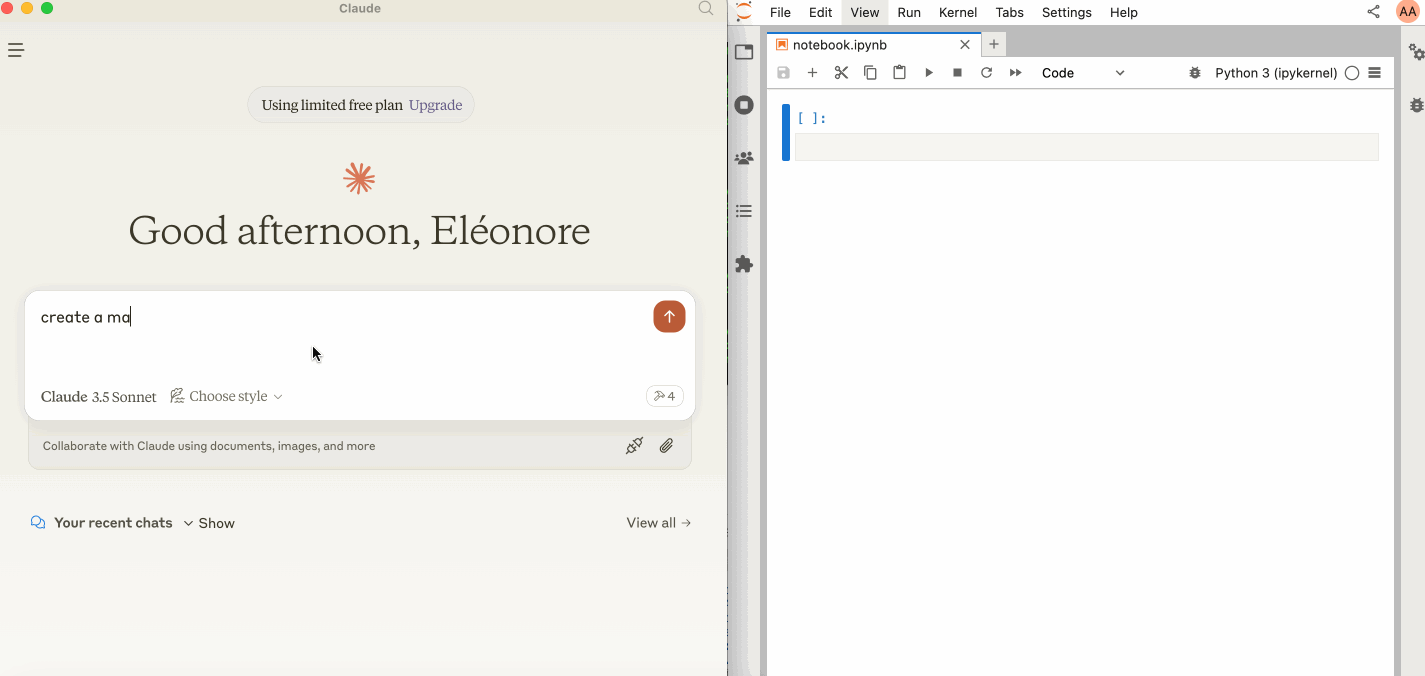About
A lightweight MCP server that connects to a running JupyterLab instance, enabling AI agents to add and execute code or markdown cells in real-time notebooks.
Capabilities

What Problem Does the Jupyter MCP Server Solve?
Developers building AI‑powered workflows often need to let an assistant interact with a live Jupyter notebook—adding code, running experiments, or documenting results. Traditional approaches require manual SSH sessions, API wrappers, or custom tooling that can be brittle and difficult to maintain. The Jupyter MCP Server bridges this gap by exposing a Model Context Protocol interface directly over an existing local JupyterLab instance. It translates MCP tool calls into notebook operations, allowing AI assistants to manipulate notebooks as if they were first‑class resources.
Core Functionality and Value for AI Developers
At its heart, the server listens on a configurable port and authenticates against JupyterLab using the same token that powers the notebook. Once connected, it offers a set of high‑level tools: adding and executing code cells, and inserting markdown cells. These actions are atomic and immediately reflected in the notebook thanks to Jupyter’s real‑time collaboration features. For developers, this means a single, lightweight service that turns notebook manipulation into a declarative API, eliminating the need to write custom drivers or parse notebook JSON manually.
Key Features Explained
- Tool‑centric design – Each operation is a reusable tool that the AI can call with simple JSON payloads.
- Real‑time updates – Changes appear instantly in the notebook UI, so developers can see the assistant’s actions live.
- Secure token integration – The server inherits JupyterLab’s authentication, ensuring only authorized clients can modify notebooks.
- Docker‑friendly deployment – A prebuilt image lets the server run in isolation, with environment variables exposing the notebook URL, token, and target file.
- Cross‑platform configuration – The README provides ready‑to‑use JSON snippets for macOS, Windows, and Linux, simplifying setup in Claude Desktop.
Real‑World Use Cases
- Automated experimentation – An AI can propose a new algorithm, add the corresponding code cell, and execute it to generate results.
- Data exploration – By inserting markdown explanations alongside code, the assistant can produce a narrative data analysis workflow.
- Rapid prototyping – Developers can ask the assistant to scaffold a notebook structure, then iterate on it without leaving their IDE.
- Collaborative teaching – Instructors can let an AI tutor add explanations and code examples on the fly during live sessions.
Integration into AI Workflows
The server fits naturally into existing MCP‑enabled pipelines. Once the entry is added to a Claude Desktop configuration, the assistant can invoke or with minimal context. The tools are stateless, so they can be chained: the assistant adds a code cell, executes it, and then inserts a markdown summary of the output. Because MCP supports rich context propagation, the assistant can reference previous cell outputs or notebook metadata, enabling sophisticated, stateful interactions.
Standout Advantages
What sets the Jupyter MCP Server apart is its minimal footprint and tight coupling to JupyterLab’s native features. It leverages the built‑in real‑time collaboration engine, so edits are instantly visible to all collaborators. The Docker image removes dependency headaches, and the clear tool definitions make it straightforward for AI developers to extend or customize behavior. In short, this server turns a standard Jupyter notebook into an AI‑driven workspace with no custom code required, accelerating experimentation and collaboration across data science teams.
Related Servers
Data Exploration MCP Server
Turn CSVs into insights with AI-driven exploration
BloodHound-MCP
AI‑powered natural language queries for Active Directory analysis
Google Ads MCP
Chat with Claude to analyze and optimize Google Ads campaigns
Bazi MCP
AI‑powered Bazi calculator for accurate destiny insights
Smart Tree
Fast AI-friendly directory visualization with spicy terminal UI
Google Search Console MCP Server for SEOs
Chat‑powered SEO insights from Google Search Console
Weekly Views
Server Health
Information
Explore More Servers
API-Market MCP Server
Expose 200+ APIs via Model Context Protocol
Stock Price MCP Server
Real‑time and historical stock data via MCP
Public APIs MCP
Semantic search for free public API catalog
Raydium LaunchLab MCP
Launch, buy, and sell tokens on Raydium Launchpad via AI agents
Mcp OpenAI Complete
Text completion bridge for LLMs via MCP protocol
Dify MCP Server
Turn a Dify app into a private MCP endpoint